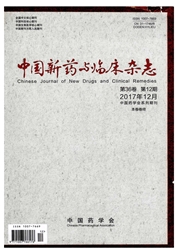

 中文摘要:
中文摘要:
水杨酸盐类制剂及其相关化合物对不同细菌的作用是多样的。首先,水杨酸盐类制剂抑制很多细菌如大肠杆菌、铜绿假单胞菌、幽门螺杆菌及表皮葡萄球菌等的生长,并影响细菌的菌毛、鞭毛、生物被膜及尿素酶等毒力因子的生成及活性,从而改变其致病性。此外,水杨酸盐类制剂改变细菌对抗菌药的敏感性:一方面,生长在水杨酸盐类制剂中的大肠杆菌、鼠伤寒沙门杆菌、金黄色葡萄球菌等可产生多重抗菌药耐药,但对于氨基糖苷类抗菌药,水杨酸盐类制剂却使细菌对其敏感性提高;另一方面,幽门螺杆菌及白色念珠菌等在水杨酸盐类制剂的作用下,对抗菌药的敏感性提高。
 英文摘要:
英文摘要:
Salicylates and the related compounds have various effects on different bacterial species with inhibition on the growth of many bacteria, such as Escherichia coli, Pseudomonas aeruginosa, Helicobacter pylori and Staphylococcus epidermidis, and furthermore affect the activity and production of fimbriae, flagellum and urease, vacuolating cytotoxin, biofilm, slime; and finally change their pathogenic activities. In vitro, these drugs can alter the susceptibilities of bacteria to some anti-bacterial agents. Salicylates can induce the intrinsic multiple antimicrobial resistance phenotype in many bacteria, such as Escherichia coli, Salmonella typhimurium and Staphylococcus aureus, but increase the susceptibilities of some bacteria to aminoglycosides. On the other hand, salicylates can also increase the susceptibilities of Helicobacter pylori and Candida albiccans to anti-bacterial agents.
 同期刊论文项目
同期刊论文项目
 同项目期刊论文
同项目期刊论文
 期刊信息
期刊信息
